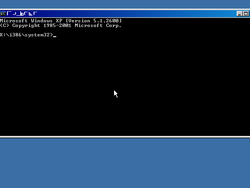PicoXP: Difference between revisions
Yellows111 (talk | contribs) (subjective if this deserves the Category:Bootlegs treatment also "irradicated"?) |
No edit summary |
||
| Line 25: | Line 25: | ||
<references /> |
<references /> |
||
[[Category:Bootlegs based on Windows XP]] |
[[Category:Bootlegs based on Windows XP]] |
||
[[Category:Bootlegs originating from an unknown continent]] |
|||
[[Category:Bootlegs]] |
[[Category:Bootlegs]] |
||
Revision as of 15:19, 3 December 2022
| Crusty Windows bootleg | |
 The desktop of a PicoXP live install | |
| Original OS | Windows XP SP2[1] |
|---|---|
| Release date | March 23, 2013 |
| Author | pscEx |
| Country | ? |
| Language(s) | English |
| Architecture(s) | x86 |
| File size | 15 MB |
| Download link | PicoXP.iso |
PicoXP is a bootleg live Windows XP CD by pscEx. It is an extremely minimal CD (only taking up about 15 MB) making it the smallest bootleg in the XP category. It was built with WinBuilder, a 'free application designed to build and customize boot disks based on Microsoft Windows'.[2] The CD is intended to be the successor/replacement of NanoXP[3], though the build sizes seem to be around the same.
Description
It is basically WinPE, but with everything removed. And I do mean everything. To the point where window titles don't even display properly because there aren't any fonts. Because so many features have been stripped from the OS, only absolute core programs such as cmd, winlogon, and ntoskrnl will actually run. No GUI applications would probably be able to run, however command-line programs with the appropriate libraries installed beforehand may work?
Changes from Windows XP
- The removal of practically every last feature and program except for cmd, winlogon, and ntoskrnl, making it basically unusable.
- Fonts appear to be completely eradicated, resulting in elusive hieroglyphics in window titles (and potentially programs, if there's even a chance of getting one that isn't cmd, ntoskrnl, or winlogon working)
See also
References
- ↑ This can depend on what install medium was used when compiling the WinBuilder project.
- ↑ WinBuilder, from Wikipedia, the free encyclopedia
- ↑ NanoXP, from reboot.pro